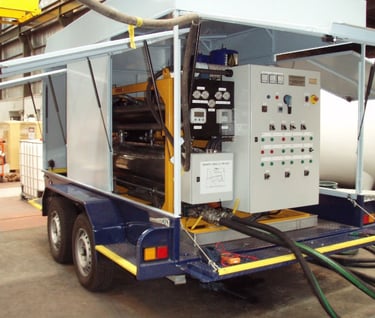Transformer oil filteration
Transformer oil filtration is a crucial process in maintaining the health and efficiency of transformers. Transformers play a vital role in the transmission and distribution of electricity and their smooth operation relies greatly on the quality of the insulating oil within them. Over time the oil can become contaminated with impurities such as water particulate matter and dissolved gases which can adversely impact the performance and lifespan of the transformer. Transformer oil filtration also known as oil purification is the process of removing these impurities from the oil to enhance its dielectric strength and preserve its insulation properties. The filtration process typically involves the use of specialized equipment such as transformer oil filters which efficiently remove contaminants while ensuring minimal oil loss.
There are several benefits to regularly filtering transformer oil. Firstly the removal of water content is critical as water can negatively affect the dielectric strength of the oil leading to electrical breakdown and potential transformer failure. Filtration helps eliminate water molecules and moisture preventing any unwanted electrical arcing or corona discharge. Particulate matter such as dust dirt and metal particles can also accumulate in transformer oil over time. These contaminants can cause wear and tear on transformer components leading to reduced efficiency increased heat generation and even short-circuits. By filtering the oil and eliminating these particles the transformer's overall performance and reliability can be greatly improved.
Dissolved gases such as oxygen nitrogen and methane can also find their way into transformer oil. As the transformer operates these gases can react with the oil and form acidic by-products which decrease the insulation ability of the oil. Filtration helps remove these dissolved gases thereby improving the oil's insulating properties and extending the transformer's operational life. The process of transformer oil filtration involves passing the oil through various filtering media such as activated alumina Fuller's earth or cellulose to trap and remove impurities. The choice of filtration media depends on the specific contaminants present in the oil and the level of filtration required. Regular maintenance and periodic oil filtration are essential to ensure the optimal performance and longevity of transformers. Ideally transformer oil should be filtered at least once every two years and more frequently if the oil shows signs of contamination or if the transformer is subjected to high-stress conditions.
It is important to engage professional services for transformer oil filtration to ensure that the process is conducted correctly and efficiently. Industry experts utilize specialized equipment such as transformer oil filtration machines which are designed to handle the unique requirements of transformer oil purification. These machines not only remove impurities but also facilitate the degassing and dehydration processes. In conclusion transformer oil filtration is a critical maintenance procedure that helps preserve the integrity and performance of transformers. By removing water particulate matter and dissolved gases the dielectric strength and insulation properties of the oil can be effectively restored. Regular filtration not only extends the operational life of the transformer but also enhances its efficiency and reliability ultimately contributing to the smooth transmission and distribution of electrical power.


